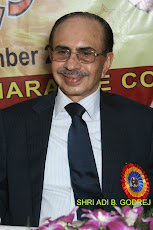This is an article from the Wall Street Journal on how Face Book ignites entrepreneur spirit in the campuses.I thought this article would be a great eye opener for youngsters and pasted here!!
ENTERPRISE http://online.wsj.com/article/SB121124707865805855.html?mod=2_1559_middlebox
Face Book Ignites Entrepreneurial Spirit at Harvard
Students, Graduates Start Firms, Using The Site as a Model
By VAUHINI VARA
One day during Trip Adler's sophomore year at Harvard University, he saw fellow undergraduates Mark Zuckerberg and Dustin Moskovitz outside their dormitory with suitcases and boxes. When Mr. Adler asked what the two -- who happened to be Facebook Inc.'s co-founders -- were doing, Mr. Moskovitz lightly replied that they were moving from Cambridge, Mass., to Silicon Valley "to make Facebook big."
"I was so jealous," recalls Mr.Adler, now 23 years old. "I thought, 'I've got to find an idea and drop out of Harvard.'"
INDEPENDENT STREET BLOG
Teen jobs: Think Facebook, not pizza delivery. Read Wendy Bounds's post and share your thoughts.
Mr. Adler didn't leave school, but after graduating in 2006, he did start an online document-sharing company. San Francisco-based Scribd Inc., employs 12 people and attracts 11.1 million monthly visitors, according to Web-tracking company comScore Inc. It has raised nearly $3.9 million from Redpoint Ventures and other venture-capital and individual investors.
Mr. Adler is just one of the Harvard students who have caught start-up fever since Facebook, founded when Mr. Zuckerberg was at Harvard in 2004, exploded in popularity. Other recent Harvard-born start-ups include Internet companies Kirkland North Inc., Drop.io Inc. and Labmeeting Inc. And Facebook has become a model for these start-ups on many fronts, from the look of company Web sites to their corporate strategies.
"I would not hesitate for a second to say Facebook's a motivator," says Paul Bottino, director of Harvard's Technology & Entrepreneurship Center. "Facebook creates would-be Facebooks." He says a start-up contest this year attracted 55 entries, up from 10 to 18 for past contests.
'Noticeably Behind'
Facebook isn't the only well-known start-up spawned at Harvard. In the 1970s, Bill Gates dropped out of the school to found Microsoft Corp. But that didn't produce the immediate copycat phenomenon that Facebook is seeing, because start-ups then took more money and time to get off the ground, let alone rise to national prominence. By the time Microsoft became known in the early 1990s, many of Mr. Gates's former classmates were settled in their adult lives and had less inclination to follow in his footsteps than Mr.Zuckerberg's peers do now.
And the idea of a college start-up culture isn't new to Silicon Valley. Stanford University leased land to Hewlett-Packard Co., started by Stanford alums, as far back as the 1950s. Today, Stanford President John Hennessy is a board member at Cisco Systems Inc. and Google Inc., two companies that began as projects at Stanford. Yahoo also began as a Stanford project.
Harvard, though, has long had a relatively sleepy start-up culture and has shunned a cozy relationship between academics and industry. "Harvard is very noticeably behind," says Paul Graham, a partner at Y Combinator, a Cambridge, Mass., and Mountain View, Calif., company that invests in start-ups, including Scribd and Kirkland North.
Mr. Graham, who earned a doctoral degree at Harvard in 1990, started Viaweb Inc., an online-commerce company that was acquired by Yahoo in 1998. He and others around the university in the 1990s recall few Harvard-born tech start-ups besides Viaweb and LinkExchange, a Web-advertising company that was sold to Microsoft in 1998.
Now, Harvard is taking steps to get ahead. In 2000, the university loosened a rule prohibiting students from running companies from dorm rooms, but it still required that start-ups notify the university of their existence and "gain approval." Last year, it discarded the notification-and-approval rule, although some restrictions still exist.
In the past eight years, Harvard has introduced more classes, clubs and contests for entrepreneurs. Mr. Bottino says those decisions weren't directly related to Facebook, but he acknowledges that Facebook's success has given Harvard students a more-entrepreneurial bent.
I Want to Be Like Mark
Indeed, Mr. Zuckerberg has quickly become a Harvard celebrity. Graduate Matthew Siegel remembers a college-holiday ski trip to Colorado that Messrs. Zuckerberg and Moskovitz went on during Facebook's early days. Instead of skiing, Mr. Siegel recalls, the Facebook co-founders spent their days camped in the lobby of a nearby Ritz-Carlton hotel where they went online and worked on Facebook.
"I was like, 'Why are those guys just sitting around working?'" Mr. Siegel recalls. "Now, I'm like, 'Oh. That's why.'"
Over the past few years, privately held Facebook, based in Palo Alto, Calif., has grown from a handful of workers to about 550 employees. The social-networking site attracted 109.2 million visitors in March, according to comScore. Last year, Microsoft bought a 1.6% stake in Facebook for $240 million, valuing the start-up at $15 billion.
"It's really exciting for me when I hear that people from Harvard or anywhere are building interesting things," says Mr. Zuckerberg, 24. "To think that they were in some way inspired by what we've done is really flattering."
Among them is Mr. Siegel. After graduating from Harvard in 2005, he went to work for a management-consulting firm. Inspired by Messrs. Zuckerberg and Moskovitz, he quit after several months to work on Indaba Media LLC, which lets musicians collaborate online. IndabaMusic.com launched in February 2007.
A month later, Mr. Adler's Scribd opened to the public.
Last August, Sam Lessin, Mr. Siegel's friend and a fellow Harvard grad, left his management-consulting job to work on Drop.io, a file-sharing service. New York-based Drop.io has raised $3.9 million from RRE Ventures, DFJ Gotham and other venture-capital investors.
Doing as Facebook Does
Many of the start-ups avoid comparing themselves to Facebook because they want to be judged on their own merits. Nonetheless, they say Facebook's approach has served as a model in one way or another.
Labmeeting, a community Web site for scientists started by Mr. Adler's college roommate, uses a log-in page that resembles an old Facebook log-in page. Founder Mark Kaganovich, 23, says Labmeeting tries "to move away from the Facebook look and feel" to avoid comparisons but he and others at his company were probably "influenced" by Facebook's design.
Meanwhile, Kirkland North, an online-game company founded this year by three recent Harvard graduates and one Yale University graduate, launched its game at Stanford and now plans on expanding to other colleges before opening publicly -- an approach that allowed Facebook to control its early growth. The Web-based strategy game, called Turf, organizes players into teams based on where they live on a college campus, another idea reminiscent of Facebook, which organizes its users into "networks" based on where they live.
Mr. Adler, for his part, is studying Mr. Zuckerberg himself. Through a Scribd investor, he recently scored a dinner meeting with Mr. Zuckerberg, who advised him to keep control over his "strategic vision," as he has done at Facebook.
"We're just focused on building a good product," Mr.Adler says of Scribd, echoing comments Mr. Zuckerberg often has made publicly.
There is one thing Mr. Adler admits will always set him apart from Messrs. Zuckerberg and Gates: He earned a degree from Harvard. "I can never take it back," he says. "I'll always be a graduate."
Thailand or India
-
The world of today is changing at an unprecedented pace, and that pace of
change is only going to accelerate. The good news is that the change is
mostly in...
2 weeks ago






No comments:
Post a Comment